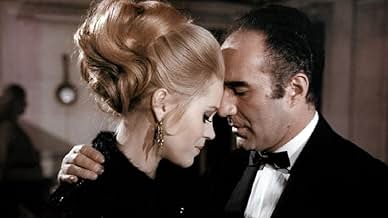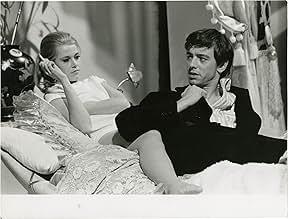Alexandre a épousé en secondes noces la magnifique Renée, avec laquelle il vit accompagné de son fils, né de son premier mariage. Renée s'entend rapidement très bien avec son beau-fils, à te... Tout lireAlexandre a épousé en secondes noces la magnifique Renée, avec laquelle il vit accompagné de son fils, né de son premier mariage. Renée s'entend rapidement très bien avec son beau-fils, à tel point qu'une passion brûlante débute entre eux.Alexandre a épousé en secondes noces la magnifique Renée, avec laquelle il vit accompagné de son fils, né de son premier mariage. Renée s'entend rapidement très bien avec son beau-fils, à tel point qu'une passion brûlante débute entre eux.
- Réalisation
- Scénario
- Casting principal
- Récompenses
- 1 nomination au total
Tina Aumont
- Anne Sernet
- (as Tina Marquand)
Joël Barbouth
- Un copain de fac de Maxime
- (non crédité)
Joé Davray
- Le jardinier
- (non crédité)
Hélène Dieudonné
- La bonne
- (non crédité)
Simone Valère
- Madame Sernet
- (non crédité)
Dominique Zardi
- L'invité au turban du bal vert
- (non crédité)
Avis à la une
If you are curious enough to know how abysmal French post nouvelle vague cinema can turn,this is the movie to choose.Adapting the second volume of Emile Zola's Rougon-Macquart saga and transposing the action to the sixties -complete with pop art,rock music and sitar!!!-Roger Vadim completely makes a fool of himself:the dialogue is so ridiculous that it's involuntary funny:(Piccoli to his wife who wants to get a divorce "i can't give you your money back;I have invested it in my business.Fonda(the wife):but it's robbery! )Fonda wants to get divorce because she's in love with her stepson,Piccoli's offspring.
Jane Fonda ,after "Barbarella" ,will turn around from these Vadim disasters and come back to making great movies with "they shoot horses don't they?"(1969)Of course,Claude Renoir's cinematography is astounding as ever and redeems this laughable soap opera a bit.So does Piccoli's desirable mansion:the conservatory and the bedrooms where Fonda and her lover play around while avoiding prying eyes,que c'est chic!
Jane Fonda ,after "Barbarella" ,will turn around from these Vadim disasters and come back to making great movies with "they shoot horses don't they?"(1969)Of course,Claude Renoir's cinematography is astounding as ever and redeems this laughable soap opera a bit.So does Piccoli's desirable mansion:the conservatory and the bedrooms where Fonda and her lover play around while avoiding prying eyes,que c'est chic!
Flirtatious Jane Fonda, married (but bored) to an older millionaire, has a tricky relationship with her 20-ish stepson which leads to a steamy secret affair. French-Italian co-production directed by Roger Vadim, who shows off an amusingly twisted sense of humor (odd for a director who, with "Barbarella" two years later, showed no sense of humor at all). Fonda (Mrs. Vadim at the time) has a marvelously wicked gleam in her eyes: this lady is determined to have not just her slice of the cake but the entire dessert! The film has some problems, though only minor ones: the voiceover work is a mismatch with the actors being dubbed (a constant irritant, as is the sound in general), while Michel Piccoli's role as Fonda's moneyed husband is sketchy (he schemes on the side, off-camera, so we only see the results). Also, the score by Jean Bouchéty and Jean-Pierre Bourtayre is repetitive and a wee bit excruciating. Nevertheless, Fonda and Peter McEnery (as the handsome kid she becomes obsessed with) are first-rate, as is the chilling ending. A most peculiar concoction, multi-layered and often devastating, though it looks terrific with a lightly-mod production design and art direction. **1/2 from ****
From what little I've watched of Vadim's work, this is his most consistently satisfying effort (though the best overall film would still be his famous horror compendium SPIRITS OF THE DEAD [1968], co-directed with Federico Fellini and Louis Malle).
Based on a novel by Emile Zola (curiously enough, the very next day I watched THE LIFE OF EMILE ZOLA [1937], a superb Hollywood biopic!), the film deals with a bourgeois family disrupted when the ageing patriarch's second and much younger bride falls for her husband's son from his earlier marriage (who is her peer); while the script isn't especially deep, the film is absorbing all the way. Impeccably shot by Claude Renoir, its garish style is very typical of 60s European Art-house cinema and the sitar-tinged score even gives it a psychedelic vibe!
The three main roles - Jane Fonda (married to Vadim at the time and therefore still in her "sex kitten" days), Peter McEnery (a surprising choice but a good one) and Michel Piccoli (effortlessly hypnotic, he's simply one of the finest - if largely unsung - actors of his generation) - are splendidly filled. The ending is somewhat abrupt and unresolved but, again, it's totally in keeping with the times in which it was made!
Based on a novel by Emile Zola (curiously enough, the very next day I watched THE LIFE OF EMILE ZOLA [1937], a superb Hollywood biopic!), the film deals with a bourgeois family disrupted when the ageing patriarch's second and much younger bride falls for her husband's son from his earlier marriage (who is her peer); while the script isn't especially deep, the film is absorbing all the way. Impeccably shot by Claude Renoir, its garish style is very typical of 60s European Art-house cinema and the sitar-tinged score even gives it a psychedelic vibe!
The three main roles - Jane Fonda (married to Vadim at the time and therefore still in her "sex kitten" days), Peter McEnery (a surprising choice but a good one) and Michel Piccoli (effortlessly hypnotic, he's simply one of the finest - if largely unsung - actors of his generation) - are splendidly filled. The ending is somewhat abrupt and unresolved but, again, it's totally in keeping with the times in which it was made!
This one has a bit of merit thanks to the performance of Fonda and Piccoli. The soap opera takes us into the lives of the rich and very rich. A bored housewife plays with her stepson and all sorts of naughty things pop up. When father catches on, he tortures them in his most wicked way by playing mind games. This and the decline of Fonda's sanity are the highlights to a film that could have faired better under a Master's control!
Though this movie is based on the novel by Émile Zola, the story is as old as antiquity. Phaedra was a Greek legend/tragedy which must have inspired Zola. Phaedra is also the title of a movie shot in Greece by Jules Dassin in 1962 (4 years before Vadim's La Curée) starring Melina Mercouri. They all revolve around the theme of an adulteress wife who falls in love with her stepson. They usually end tragically. The difference with Roger Vadim's movie is the way he plays on the eroticism that exudes from the ever beautiful Jane Fonda. She plays the role of a Canadian young heiress who marries this distinguished french bourgeois businessman only to get aroused by his son who is closer to her age. If you like beautiful erotic shots and situations, you will like this. Of course Barbarella (2 years later by the same director and Jane Fonda) is even more erotic.
Le saviez-vous
- AnecdotesRoger Vadim sold several intimate nude shots of Jane Fonda taken on the closed set to Playboy without Fonda's knowledge or permission.
- Versions alternativesAfter a scene-by-scene comparison, it's obvious that the VHS version of this film is an entirely different English-language cut from the all-French DVD release. Fonda and McEnery speak their own English and French in the respective versions, while Michele Piccoli is dubbed in the English cut. It's very interesting, because even in the non-dialogue scenes, different takes--and often different actions--were used for each version. (Note: You may also want to reference this in the Language section.)
- ConnexionsFeatured in From the Journals of Jean Seberg (1995)
- Bandes originalesBaby You Know What You're Doing
Written by Arthur Brown
Performed by The Arthur Brown Set (backed by The Sharks)
Meilleurs choix
Connectez-vous pour évaluer et suivre la liste de favoris afin de recevoir des recommandations personnalisées
- How long is The Game Is Over?Alimenté par Alexa
Détails
- Date de sortie
- Pays d’origine
- Langue
- Aussi connu sous le nom de
- The Game Is Over
- Lieux de tournage
- Sociétés de production
- Voir plus de crédits d'entreprise sur IMDbPro
- Durée1 heure 38 minutes
- Rapport de forme
- 2.35 : 1
Contribuer à cette page
Suggérer une modification ou ajouter du contenu manquant
































